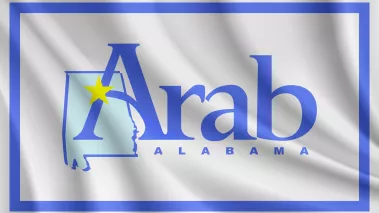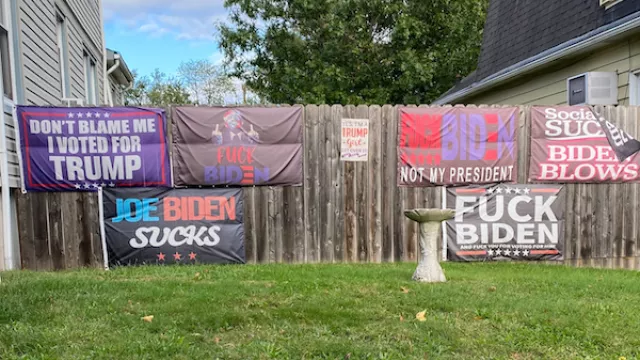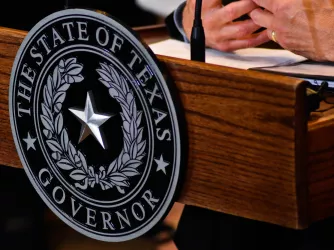Table of Contents
Sign of the times: Alabama city bans signs containing ‘hate speech,’ ‘indecent’ content

Shutterstock.com
Vulgar. Lewd. Indecent. Hateful.
Those are four types of speech the city of Arab, Alabama, bans from signs within its borders. But as FIRE explained in a letter to the city on Tuesday, they’re also four types of speech protected by the First Amendment.
Arab’s sign ordinance reads, “While trying to maintain content-neutrality, signs that contain vulgar, threatening, hate speech, lewd or indecent content are not permitted.”
If Arab is trying to maintain content neutrality, it’s not doing a very good job. The restrictions are indisputably content-based. You can’t judge whether a sign is “vulgar,” for instance, without viewing and interpreting its content. And content-based speech restrictions — including those applied to signs — are presumptively unconstitutional.
Whether speech is vulgar, lewd, indecent, or hateful is in the eye of the beholder, and the First Amendment recognizes the danger of giving the government privileged beholder status.
The city may regulate “threatening” signs to the extent this restriction applies only to “true threats” — that is, statements through which the speaker seriously expresses an intent to commit unlawful violence against a specific individual. True threats are one of the few, narrowly defined exceptions to the First Amendment.
But the First Amendment makes no such categorical exceptions for “hate speech” or speech deemed “vulgar,” “lewd,” or “indecent.”
That’s why the Supreme Court, in R.A.V. v. St. Paul (1992), struck down an ordinance that prohibited placing on any property symbols that provoked “anger, alarm or resentment in others on the basis of race, color, creed, religion or gender.” It’s also why, in Snyder v. Phelps (2011), the Court upheld the First Amendment right of protesters to hold insulting signs outside soldiers’ funerals.
“As a Nation,” the Court explained, “we have chosen . . . to protect even hurtful speech on public issues to ensure that we do not stifle public debate.”
More recently, a New Jersey appellate court overturned the obscenity conviction of a woman who displayed a “Fuck Biden” banner in her yard. The case demonstrates how ordinances like Arab’s risk suppressing core political speech, which occupies “the highest rung of the hierarchy of First Amendment values,” as Justice John Paul Stevens wrote for the majority in NAACP v. Claiborne Hardware Co. in 1982. Of course, the First Amendment doesn’t lean left or right, and equally protects your right to put a “Fuck Trump” sticker on your car.

VICTORY: On First Amendment grounds, NJ woman’s ‘Fuck Biden’ flags free to fly another day
News
Andrea Dick’s lawsuit proceeds after defeating township’s motion to dismiss — paving the way toward recovery after being ordered to remove political banners criticizing Joe Biden.
Whether speech is vulgar, lewd, indecent, or hateful is in the eye of the beholder, and the First Amendment recognizes the danger of giving the government privileged beholder status.
As the Supreme Court said in yet another case protecting speech that might cause offense — this time a man wearing a jacket that read “Fuck the Draft” in a courthouse — “one man’s vulgarity is another’s lyric.” Without the First Amendment, the government’s subjective interpretations of vague terms like “indecent” and “hate speech” would reign supreme and inevitably be used to censor dissenting and unpopular speech.
The Arab ordinance’s vagueness is another reason it fails constitutional scrutiny. The terms “vulgar,” “lewd,” “indecent,” and “hate speech” are left undefined. Yet laws must give ordinary people notice of what is and isn’t prohibited so they can govern themselves accordingly.
Would a yard sign that reads, “STD 2024 | STOP THE DONALD | LET’S STOP THE DISEASE ONCE AND FOR ALL” violate the ordinance?
What about a sign that says, “I IDENTIFY AS NON-BIDENARY?
Your guess is as good as mine.
Potentially encountering signs we find obnoxious or offensive is the modest price of freedom. When you see a sign you don’t like, you can ignore it, criticize it, or put up your own sign displaying a counter-message. But the Constitution rules out government intervention as a solution.
FIRE calls on the city of Arab to honor its citizens’ First Amendment rights by eliminating its unconstitutional sign restrictions. We’ll keep readers updated on the city’s response.
Recent Articles
FIRE’s award-winning Newsdesk covers the free speech news you need to stay informed.

Gov. Greg Abbott’s order ‘hardening state government’ against China is dangerously hard to parse

Right, left, and in-between: Can we bring our differences to the table?

From the UK to Germany to Singapore: Police are watching what you post


